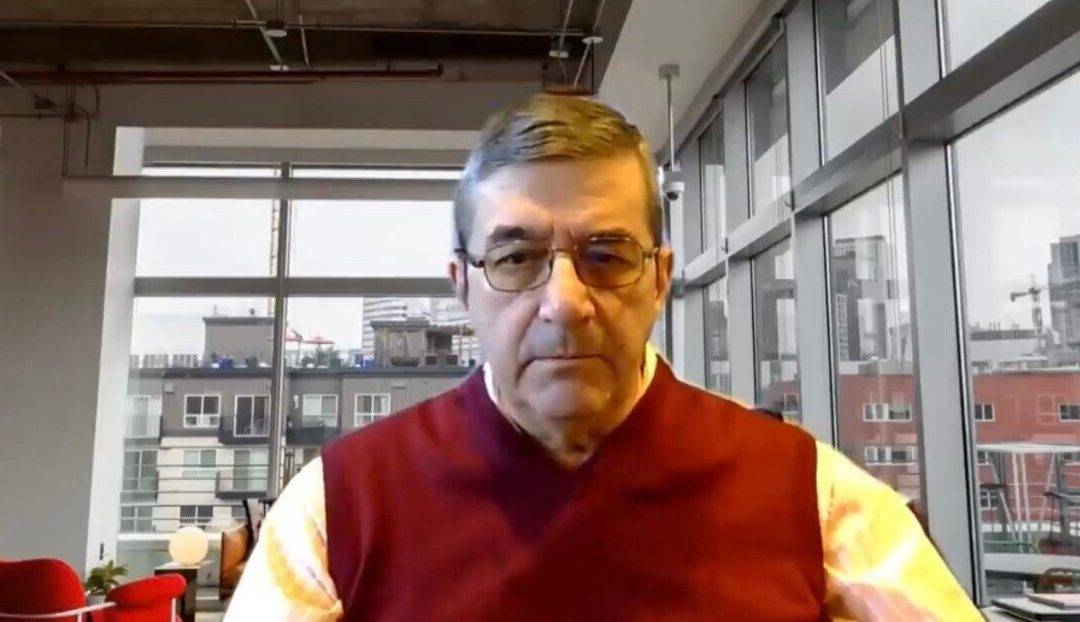
Dr. Srdja Trifković: The Relationship between Serbs and the West in the Work of Metropolitan Amfilohije
Dr. Srdja Trifković
The Relationship between Serbs and the West in the Work of Metropolitan Amfilohije
on the Fifth Anniversary of His Repose
I had the honor and pleasure of meeting the late Metropolitan of Montenegro and the Littoral Amfilohije in 1996 and from then until his death I maintained regular contact with him. With his blessing, I organized a series of visits by impartial and well-intentioned foreign guests to Montenegro, as well as academic meetings and other activities in the USA and Canada, which we considered expedient.
Our last meeting was in Cetinje in early March 2020, when “Grandpa” blessed me to go to America on a ten-day tour in order to familiarize the local media, academic circles and leaders of other religious communities with the problems of our Church that gave rise to the liturgies. Immediately upon my arrival on the western side of the Atlantic, however, drastic measures were introduced to control the corona epidemic. All meetings in New York and Washington were canceled, and I was only able to return to Europe after almost three months. I contacted the Metropolitan on several occasions afterwards, but we never saw each other again. As the years pass since his repose, I often wonder to which spiritual leader from the Serbian pantheon the blessed Metropolitan Amfilohije is most comparable. In his thought and in his theological work, he combined the experiential metaphysics of Bishop Nikolaj Žički and Abba Justin of Celijski. On top of that, he was also a top-notch practical worker, as one would call a manager today: the builder and restorer of over six hundred shrines and the reviver of the ruined church infrastructure in Montenegro.
The right comparison, however, is with Saint Sava. In Serbian history, there is no figure with whom the late Metropolitan is more comparable. Living, like the greatest Serbian saint, an angelic life for the sake of Christ, he was not only a spiritual shepherd but also a champion of the spiritual and moral renewal of the people of Montenegro and Boka after half a century of Titoism.
Like Saint Sava, Amfilohije was also an excellent diplomat. This was especially evident in the difficult times in Kosovo and Metohija after the NATO occupation, when he established valuable communication with foreign military and civilian officials. Like St. Sava and Amphilochius, he made sure that no place was left without a place of worship. Like St. Sava, he was a prolific writer and polyglot, one of the most educated Serbs of his time.
Metropolitan Amphilochius multiplied his talent many times over, leaving us a legacy of a treasury in which, among other things, we find valuable pointers for the relationship of Serbs towards the Western world. This relationship has always been problematic, and it is especially so today when Serbs are exposed to brutal pressure to meekly submit to an empire that is not only earthly, but also explicitly anti-Christian. As the Metropolitan warned in Belgrade's Kolarac back in December 2009.
“Today, as a Church, as a Christian people, we find ourselves at a crossroads for the first time in history… If we want to find our authentic path and the way in which we should respond to the challenges of the times in which we live, we cannot do so in the right way unless we reflect ourselves precisely in that testimony of St. Sava and the testimony of the Kosovo Covenant… We find ourselves once again before the covenantal challenge to which we will submit ourselves to the kingdom.” (The Mystery of Christ and the Mystery of the World, pp. 406-7)
16 years ago, Metropolitan Amfilohije warned us that Europe today is “in a profound spiritual crisis and danger” and that we will not worthily resist the “covenantal challenge” if we “try to seek identity where we cannot find it and where we will not find it,” in the West, which is in total spiritual and moral decline.Једном давно и та Европа је била осољена сољу Христовом, поручује нам Амфилохије, али је кренула лошим путем. Једном давно „Црква Божија је једним срцем, једном душом и једним умом записивала и проповиједала учење о Светој Тројици, Оцу и Сину и Духу Светоме”, истакао је Митрополит у манастиру Дајбабе
February 11, 2017, on the feast of the transfer of the relics of Saint Ignatius the God-bearer; but this was done by holy men of God gathered in the name of the Lord, not by individuals:
“Unfortunately, the Church in the West entrusted this to an individual. That is the Bishop of Rome, the Pope of Rome. This was specifically defined at the First Vatican Council in 1870, where that council of theirs recorded that the Bishop of Rome is infallible in himself, and not by the consent of the Church. This is what has clouded conscience and consciousness and has influenced the separation of the Church from the West and has caused this false teaching to prevail to this day in the West.”
The Metropolitan added that much that is unfortunate has been built on this betrayal of the conciliar teaching of the Church of God: “First of all, alienation from the original evangelical faith, and then from living according to the Gospel. The Orthodox Church preserves that original evangelical faith.” One of the consequences of this state of affairs is the fact that, in the perception of the ruling elite of the modern West, nations and cultures shaped by Orthodox Christianity belong to a tradition that is not only alien to them but also ominously threatening. This deeply ingrained prejudice was manifested in the statement made in 2014 by Carl Bildt – then the Minister of Foreign Affairs of Sweden – that Orthodoxy poses a danger to Western civilization. Since 2022, the same ill will has often been expressed in the materials of the European Parliament condemning the allegedly harmful actions of the Serbian Orthodox Church in the “region” because it allegedly promotes “malignant Russian influence” and supports Serbian nationalism. We find the same ill will and the same slander in numerous, similarly intoned, media reports and quasi-academic studies throughout the Western world, which mostly refer to the Serbophobic NGO machinery of Podgorica (paid for by that same West).
On the public and political scene of the West, antipathy towards Orthodoxy is based on the fact – as Metropolitan Amfilohije points out – that “the Orthodox Church preserves the original evangelical faith”. From a post-Christian, Brussels-Davos point of view, this is truly a dangerous and subversive action of the Church. Moreover, from the point of view of Western elites, the centuries-old struggle of Orthodox peoples against Islamization, and today against the no less dangerous migrant invasion, is an unforgivable sin against the cult of “tolerance”.
The mentality of the members of the modern ruling Western elite reminds us of the attitude of Western rulers towards the Orthodox East during the Turkish invasion of Europe. At the beginning of the 15th century, the vitally endangered lands of the Roman Greeks, Bulgarians and Serbs faced the superior Ottoman invaders. The Western position at that time was clear: we will help you, but only if you renounce Orthodoxy. The Councils of Ferrara and Florence in 1439-1440 left no dilemma in this regard. The Roman delegates eventually succumbed to pressure (which the faithful people did not forgive them), but even then help did not arrive. On Tuesday, May 29, 1453, Constantinople fell to the forces of darkness.
The Serbs soon suffered the same fate. However, the Serbs possessed a crucial moral resource that sustained them in the dark centuries that followed. As Metropolitan Amphilochius tirelessly emphasized, the heritage and spirit of Kosovo and the Kosovo hero-martyrs sustained them in the belief that the forces of darkness are ultimately defeated, and that those who cling to light and virtue ultimately triumph – even when such victory seems impossible – because there is a God.
The Kosovo Covenant thus shaped the Serbs as an essentially Christian nation, as he emphasizes in dozens of texts collected here; to mention just one, “The commitment to the Kingdom of Heaven is, in fact, a commitment to the eternal and imperishable dignity of the human being and the human community of every earthly people… And there is no stronger testimony than that which is sealed with blood.”
The Metropolitan realized that the hostile attitude of the rulers of the modern West towards such a commitment of the Serbs is not the result of mere prejudice, but that it is caused by the accurate assessments of that quasi-elite that recognizes Orthodoxy as an obstacle to the realization of its political, economic and cultural ambitions in today’s world. That quasi-elite prides itself on its emancipation from faith, which is embodied in the draft constitution of the European Union from 2004, which sees the foundations of Brussels Europe in enlightenment, the rule of law, tolerance, inclusion, respect for human rights, social justice, etc. – but not in Christianity.
The consequence of de-Christianization is the collapse of Western culture and civilization. It is in full swing. It is a reality today, not just the impending process that Oswald Spengler announced more than a hundred years ago. The directors and controllers of this collapse consider any attempt at resistance to be impermissibly subversive.
At the heart of the problem is a schism in the soul of Western man, a schism of mind from heart and heart from mind. Magnified through time and history and multiplied through generations, this schism is a powerful sculptor of souls. Part of the modern world is called “Western” precisely because its origin lies in the “emancipation” of the West from alleged religious shackles through rationalism, humanism, and secularism brought about by the Age of Enlightenment. The eighteenth century created a “Western” culture of rationalist-humanist-secularist arrogance that alienates the mind from the heart and gives priority to the mind over the heart. The first bitter fruits soon followed with all the horrors brought by the French Revolution.
Metropolitan Amfilohije, however, never rejected the possibility of dialogue, and even cooperation, with Western, primarily Catholic traditionalists who are aware that we have a common enemy in the culture and ideology of post-Christian nihilism. He knew that in the circles of Catholic conservatives there is also a current embodied in a number of my colleagues and friends from America who are familiar with the Balkan situation and who see in the Serbs natural allies in the fight against the evil spirit of postmodernity.
One of them is the guardian of the Norbertine monastery of St. Michael the Archangel in Silverado in southern California, Father Hugh Barbour. I organized his visit to Montenegro on two occasions, in 2000 and 2003. Both times he supported the Metropolis by stating to the media that there was no “Montenegrin Orthodox Church”.
Metropolitan Amfilohije then sent greetings to “our good Father Hugo” on several occasions before my return to America, with whom he had otherwise had conversations in Italian. In January 2000, at lunch with a guest from California, he said that – faced with the beast of hell at every turn – Western and Eastern Christians should fight, but also maintain a contrite awareness of their own sinfulness. A few years later, when I visited his monastery, Fr. Hugh presented me with a gift of $2,000 to the Cetinje Theological Seminary; the then rector, Fr. Gojko Perović, reciprocated with a heartfelt letter of gratitude.
An American Catholic whom Metropolitan Amfilohije particularly respected was my colleague and friend Dr. Thomas Fleming, former editor of the Chronicle magazine. He follows a clear position on the issue of relations between Catholics and Orthodox: “If we do not stick together, we will hang apart.” This strictly pragmatic position, of course, has nothing to do with ecumenism.
Dr. Fleming, with the Metropolitan’s blessing, wrote and published in English the book “Montenegro: The Divided Land” (2004). It presented the facts about the history, culture, religion, and identity of Montenegrins for the first time to a Western reader in an accessible and concise manner. Fleming’s conclusion is unequivocal: “Those Montenegrins who say they are not Serbs are thereby inadvertently admitting that they no longer have any real identity.”
The outcome of the loss of the “real identity” of Euro-Atlantic integrated peoples signals the end of Western culture as an integrated system of knowledge, beliefs and behaviour. The transformation of Western society into post-history has one important feature: culture becomes redundant as a mechanism for maintaining social dynamics and integration. Material wealth, professional success and physical health are the only true goods in Western technos. Emotional experiences and personal opinions are ballast, atavistic remnants of a pre-technological, historical society. The question of meaning is excluded a priori, because the very concept of purpose has been overcome. “Culture” is a product that is consumed, not a comprehensive worldview that is experienced. The transformation of society into a socio-technological system regulated by the market signals not only the end of nations, but also the end of man.
Metropolitan Amphilochius was aware that secularism, replacing the Christian faith as the foundation of the identity of the West, also rejects the concept of a specifically European social, geographical and cultural space. Europe is therefore today on the path of historically unprecedented demographic and cultural self-liquidation. From the southern side of the Mediterranean, from Africa, as well as from the east of the Bosphorus, from Asia, the impression has been created that Europe is a very rich palace ripe for conquest, with elderly residents, a broken lock and no night watchman. The absence of historical memory has led the bearers of the Brussels Euro-consensus to build their knowledge in a virtual world. The spirit of the Enlightenment has instilled in them the arrogant idea that man can solve all the dilemmas of his existence by relying exclusively on his reason. Without the recovery of the Christian faith, the final fruit of this worldview will be the demographic collapse of every other corner of Europe and its overseas descendants.
This worldview is based on a pathological denial of the values and legitimacy of its own heritage. The Eurocrat rejects the legacy of the European family, its culture and historical experiences. At the same time, in Serbian countries, in the now quarter-century-old propaganda of the so-called "European path", the fact that Serbs in key EU countries simply do not want to accept them is obscured. In Brussels, Berlin, London... they see them as a potential Russian fifth column, as a chronic disruptive factor against which civilizational and cultural deviation should be cultivated. This fact is not subject to revision.
Today, as in the years before us, Serbs are threatened by a double danger. They are threatened by the further narrowing of their native territory. They are threatened by the simultaneous demand for further meek compliance with the cultural patterns of Western postmodernity, embodied in the parades of shame in Belgrade and Podgorica, in order to prove their maturity for the endless and completely hopeless process of “European integration”. Metropolitan Amfilohije saw in this the sale of faith for some extremely uncertain dinner. As for the parade itself, his position was clear. As he said in an interview with Peću in October 2010, deviations hide a crisis of morality and the meaning of life:
“It would be interesting to discover psychologically and anthropologically what is hidden behind the very name of the pride parade. Isn’t there, in fact, hidden behind that verbal triumphalism and the ostentation of the public appearance of gay paraders inner torment, despair and misery, a clownish cry for lost moral and spiritual balance and existential insecurity? Healthy and true love has never had and does not need such external ostentation, intrusiveness and effects. Doesn’t the subconscious feeling that such a sterile eros leads to death and nothingness, that its nature is suicidal and distorted, drive gay paraders to flee from themselves, from the edge of the abyss over which they dance the dance of death?”
The motivation of external mentors of politicized homosexuality is not in the confirmation of some kind of “tolerance”. Their goal is the permanent re-education of Serbs, in accordance with the ideological standards of the postmodern, posthuman West. These standards are evident in the persistent demand that Serbs give up Kosovo, as well as in the hysterical demonization of Russia and the Hitlerization of its leader. Both reflect the ontological intolerance of the Western elite towards Serbia and Russia as such – regardless of their actions. To bow to this evil, to “sacrifice one’s lifeblood for a European bowl of lentils or for European integration”, as Metropolitan Amfilohije put it, would mean “selling both one’s image and one’s faith for dinner – without even that bowl of lentils being on the table”.
The Metropolitan was aware of the fundamental lie on which the modern West rests: that there is no God and therefore everything is permitted; that man is capable of relying on his own ambition and reason to solve all the questions of his existence, to find an eschatological shortcut to the end of history, the end of this world. Connoisseurs of pop culture would recognize John Lennon’s recipe from the more than half-century-old hit Imagine: no heaven, no hell, in a world without nations and without faith, in which everyone lives only for today. Following this matrix, both America and Brussels-based Europe today show how far they have come on the path to achieving a satanic liberal-democratic nirvana. It rests on the same ideological premises as earlier materialistic utopian projects, from Robespierre, Lenin and Hitler to Joseph Broz, Castro and Pol Pot.
The self-hatred of Western elites on both sides of the Atlantic, the demonization of their opponents, the rhetoric of alleged freedom without real responsibility towards their fellow man, hedonism and atheism have undermined the foundations of Western societies. In order to survive, Serbs must follow the path that leads uninterruptedly from St. Sava to Metropolitan Amphilochius.
Concretely, here and today, this means resisting the pressures of the West, to which they do not belong and which does not wish them well – and staying away from the Euro-Atlantic mechanisms for grinding down the identity, culture, tradition and morality of European nations. They must remain faithful to their heritage, faith, Serbian saints and martyrs, but also to the defense of pragmatically perceived national interests in a Hobbesian world.
As the Metropolitan warned back in January 2011, almost 15 years ago, joining the EU, which would result in us losing our Jerusalem-Eastern, original European identity, our Orthodox culture, customs, language, script and Church, would be a mere sale of faith for dinner, “sitting a poor beggar at the table of a rich Havanan”. (Conversations on Spiritual Life, Church and Society, p. 165).
The wise and insightful insights in the works of Metropolitan Amfilohije and his overall legacy will help the Serbian people and the Church to remain at the height of this task. Despite all the challenges, the aspiration to preserve faith, national, cultural and spiritual identity, natural family, territorial integrity and sovereignty has the steadfast support of the vast majority of Serbs, on both sides of the Drina and from Horgoš to Bojana.
The Metropolitan's bequest is to remain true to ourselves. Only in this way – and despite all the challenges and temptations – will we look to the future not with anxiety, but with hope, faith and joy. Glory and thanks be to him!
The Metropolitanate of Montenegro and the Littoral
PHOTOS
RELATED ARTICLES
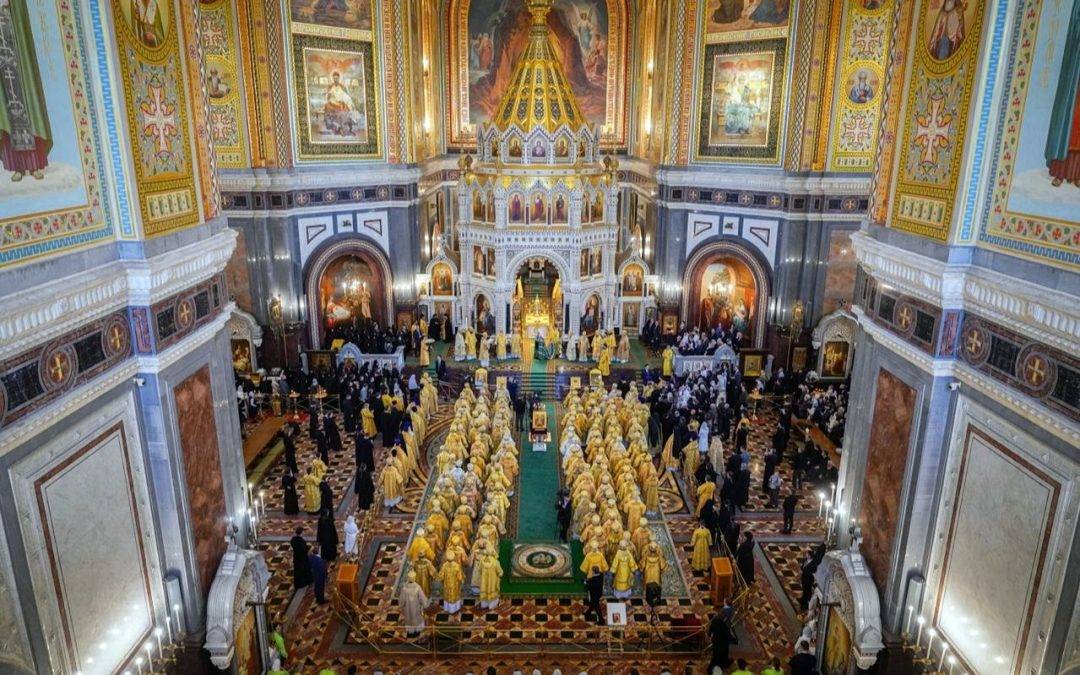
Moscow marks 17th anniversary of Patriarch Kirill's enthronement
On February 1, 2026, the Russian Orthodox Church prayerfully marked the 17th...
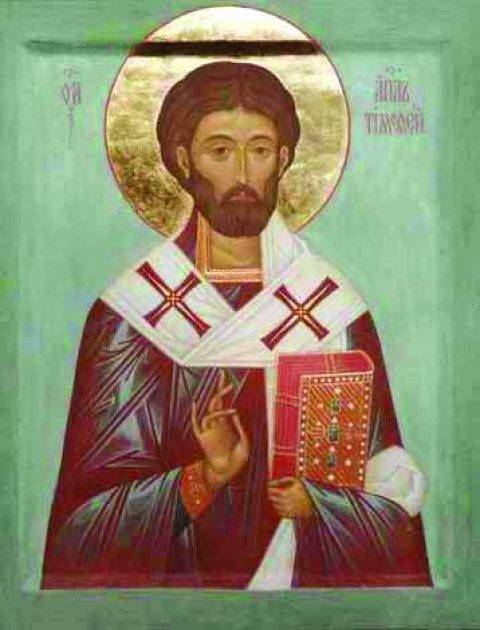
Calendar for February 4 Saint Apostle Timothy
One of the Seventy Apostles, born in Lystra of Lycaonia. His father was Greek...
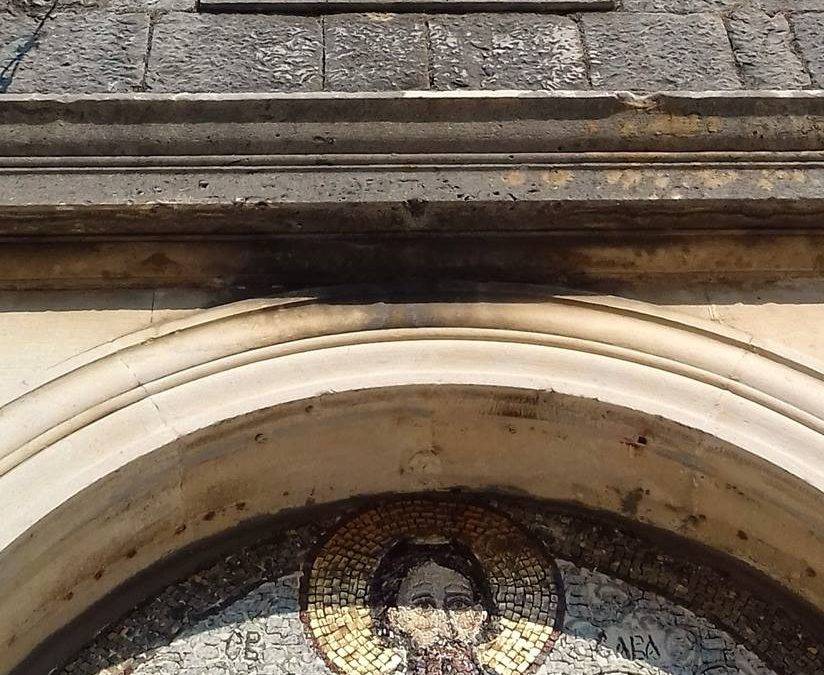
Petar D. Šerović: History and Tradition about Saint Sava in the Bay of Kotor
The most important coastal city in the Nemanjić state was Kotor in today's...


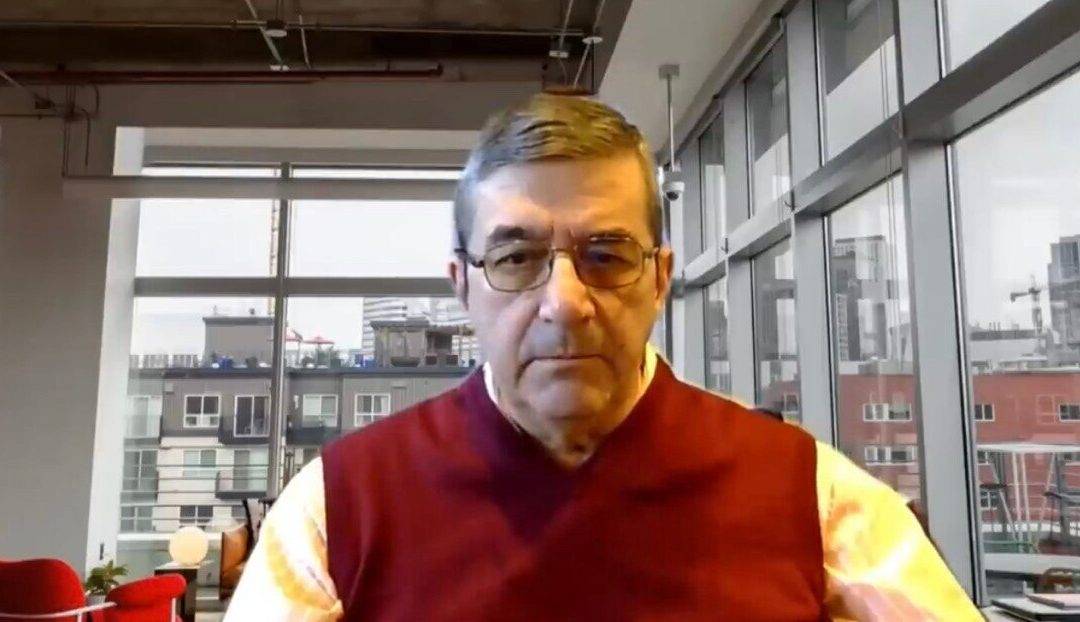

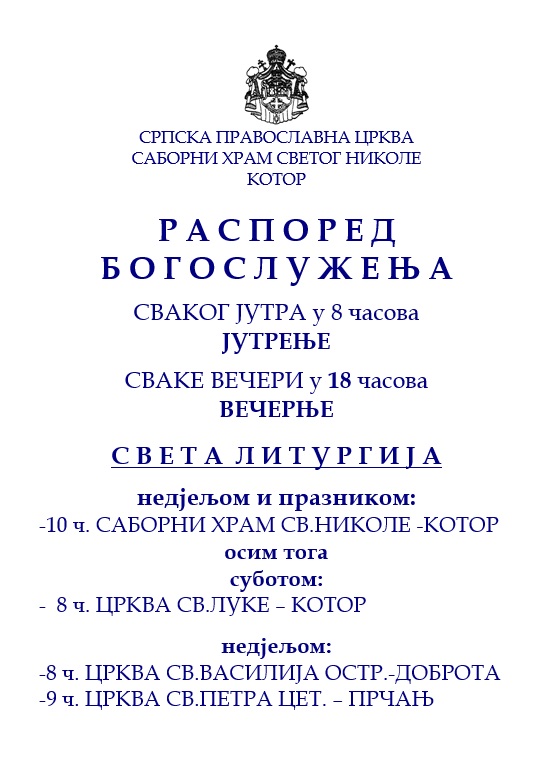
.png)